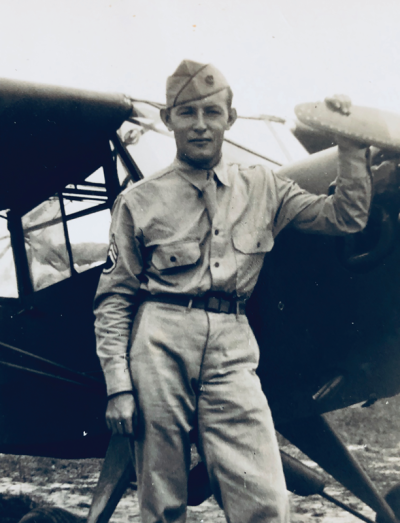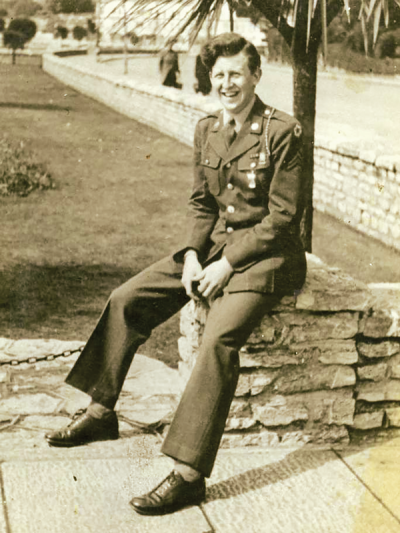
Henry Wojno landed in Normandy, France about three or four days after the initial D-Day invasion in 1944. He is among the thousands of World War II veterans remembered in Senate Resolution No. 123, which passed last month with input from Henry Wojno’s son, state Sen. Paul Wojno, D-Warren.
Photo provided by Paul Wojno

The uncle of state Sen. Paul Wojno, D-Warren, Edward Guzik was only 19 years old when he landed on Utah Beach during the first wave of the D-Day Invasion June 6, 1944.
Photo provided by Paul Wojno
LANSING/WARREN — State Sen. Paul Wojno, D-Warren, has always had a soft spot in his heart for the brave soldiers who fought during World War II.
The D-Day invasion June 6, 1944, especially hits close to home because his father, Henry Wojno, and his uncle Edward Guzik — both in the U.S. Army — were part of the battle that occupied the beaches of Normandy, France.
Guzik was at Utah Beach during the first wave on D-Day while Henry Wojno landed in Normandy about three or four days after the initial invasion.
In an effort to honor the service members who fought in the conflict, last month the Michigan Senate passed resolution No. 123 commemorating the 80th anniversary of D-Day. The resolution was adopted by the Senate during its Memorial Day ceremony held May 23.
“It’s just an acknowledgement. It’s not a public act. It’s to remember and thank the men and women that served in World War II on D-Day,” Wojno said. “We appreciate their service to our country. The World War II generation is slowly diminishing. I’m honored to recognize those who served on D-Day.”
The Senate resolution states that “approximately 156,000 Allied troops landed along a heavily fortified stretch of French coastline, seeking to breach ‘Fortress Europe’ and strike a crucial blow against the facism of Nazi Germany.”
“More than 5,000 ships and 11,000 aircraft supported the invasion, making D-Day the largest naval, air and land operation ever taken,” the resolution states. “These soldiers, many of whom were not even 20 years, faced a daunting and perilous task as they fought through the ocean surf, braving artillery shells and machine gun fire with little to no natural cover to protect against enemy guns.”
Henry Wojno was in a glider unit, but Wojno said his dad’s unit stopped training because of the casualties that were occurring during practice runs. He then became a spotter in a Piper aircraft.
“My dad was not a pilot but he would pull out binoculars to look for enemy positions,” Wojno said.
Henry Wojno served from June 20, 1942, through Sept. 30, 1945, and was also in England and Germany during the war. He served in three campaigns: the Ardennes, Central Europe and Rhineland.
Prior to being discharged, the young soldier was given a furlough to use before being sent to the Pacific. When the war ended, that assignment was canceled and Henry Wojno packed his belongings and returned home to the U.S. According to his honorable discharge papers, Henry Wojno earned several decorations and citations: three bronze service stars, a good conduct medal, one overseas service bar and one service stripe.
Guzik, who was Wojno’s mom’s brother, was just 19 when he fought at Utah Beach. He also was in the Battle of the Bulge. Wojno remembers Guzik using a cigarette lighter, which on the front read “EHG 6th Engineers Special Brigade D-Day June 6, 1944.” The back of the lighter listed all the European countries where Guzik was stationed: Scotland, England, South Wales, Luxembourg, Belgium, Germany and Holland.
Wojno had other relatives who served in World War II, including his dad’s brother, uncle Casmere Wojno, who was in Europe, and his wife Lois, who served stateside in the Navy. Henry Wojno’s childhood friend Stan Staniszewski was wounded in Sicily. The two pals married sisters after the war.
“I miss them all. They’re all gone now,” Wojno said. “When you’re a kid, you sit around and hear stories.”
Sen. Ruth Johnson, R-Holly, was among those in support of the Senate Resolution.
“I think it’s really important for newer generations of Americans to understand D-Day, and the sacrifices that were made by the men and women that showed immense courage to defend our freedoms under enemy fire thousands of miles from home,” Johnson said. “Eighty years is a long time. The further it gets away, the less people remember.
“I just can’t even imagine what it would be like to land on one of those beaches,” Johnson said. “There are men that gave their lives so we can live this way. We can learn from (history) and appreciate what we have.”
The entire Resolution can be viewed at legislature.mi.gov/documents/2023-2024/resolutionintroduced/Senate/pdf/2024-SIR-0123.pdf.
 Publication select ▼
Publication select ▼

















